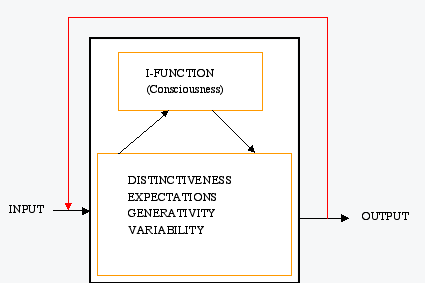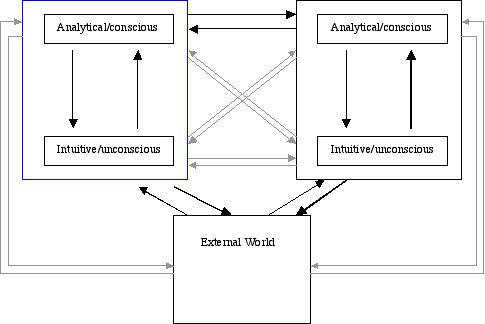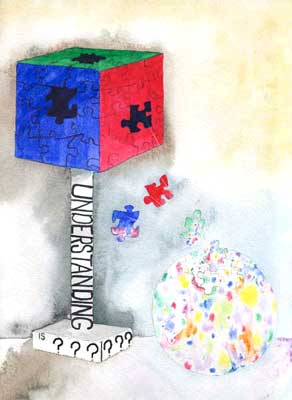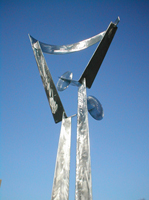 I believe the intellectual life of the whole of western society is increasingly being split into two groups. When I say the intellectual life, I mean to include also a large part of our practical life, because I should be the last person to suggest the two can at the deepest level be distinguished ... Literary intellectuals at one pole - at the other scientists ... Between the two a gulf of mutual incomprehension - sometimes (particularly among the young) hostitility and dislike, but most of all lack of understanding ... This polarisation is sheer loss to us all. To us as people, and to our society. It is at the same time practical and intellectual and creative loss, and I repeat that it is false to imagine that those three considerations are clearly separable.
I believe the intellectual life of the whole of western society is increasingly being split into two groups. When I say the intellectual life, I mean to include also a large part of our practical life, because I should be the last person to suggest the two can at the deepest level be distinguished ... Literary intellectuals at one pole - at the other scientists ... Between the two a gulf of mutual incomprehension - sometimes (particularly among the young) hostitility and dislike, but most of all lack of understanding ... This polarisation is sheer loss to us all. To us as people, and to our society. It is at the same time practical and intellectual and creative loss, and I repeat that it is false to imagine that those three considerations are clearly separable. C.P. Snow, 1959
 If the natural sciences can be successfully united with the social sciences and the humanities, the liberal arts in higher education will be revitalized ... The future of the liberal arts lies ... in addressing the fundamental questions of human existence head on, without embarrassment or fear, taking them from the top down in easily understandable language, and progressively rearranging them into domains of inquiry that unite the best of science and the humanities at each level of organization in turn.
If the natural sciences can be successfully united with the social sciences and the humanities, the liberal arts in higher education will be revitalized ... The future of the liberal arts lies ... in addressing the fundamental questions of human existence head on, without embarrassment or fear, taking them from the top down in easily understandable language, and progressively rearranging them into domains of inquiry that unite the best of science and the humanities at each level of organization in turn. E.O. Wilson, Consilience, 1998
Beginning the 21st Century:
Recognizing the Problem and the Need for Common Ground
Diversity and Discovery Institute 2000
from a program of Bryn Mawr College summer institutes for K-12 educators
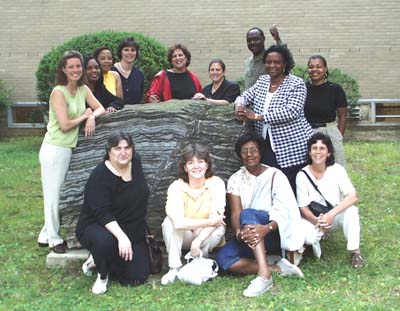 My personal view of science for many years was, well,
summed up with one word, "Yuck!"; in primary
school it was undistinguishable from the morass of
general information we learned from uninspiring
textbooks and well-meaning, but insipid teachers.
Middle school was worse: sterile classrooms in which
science was lectured at us, and labs were limited to
teacher demonstrations with very little
student-centered learning. ... Along with college pretty much came the exit of
science from my life. .... Karen Cohen (High school english teacher)
My personal view of science for many years was, well,
summed up with one word, "Yuck!"; in primary
school it was undistinguishable from the morass of
general information we learned from uninspiring
textbooks and well-meaning, but insipid teachers.
Middle school was worse: sterile classrooms in which
science was lectured at us, and labs were limited to
teacher demonstrations with very little
student-centered learning. ... Along with college pretty much came the exit of
science from my life. .... Karen Cohen (High school english teacher)
In
the past I would have stated that science is discovery
performed by highly trained and specialized people.
This was parttially due to my phobia of science as a
subject. It was something you had to take in class and
you had to make sense of it. The discovery piece was
missing. Science came from a textbook with very little
experimentation or discovery because all of the
answers were written on paper, you just needed to
read and understand them. ... I have
discovered there still exists a cultural gap in our
educational system as it relates to science. There are
teacher preparation programs that continue to steer
clear of the sujbect unless you have declared science
to be your area of certification. So we know where
that leaves the K-8 educator. This in turn becomes
apparent in some classroms where we continue to
breed a group of young people who are phobic about
science because the person doing the standing and
delivering is not comfortable with the subject matter. ... Janet Middleton (Middle school teacher)
Science has always been regarded as a very different
approach to life. In fact I used to think that it was a
way of life for some wierd people. Actually people see
scientists as nerds in the society ... Ayatola Oronti (High school science teacher)
The culture gap in education between science and
non-science is vast. One only has to talk to a
non-scientist to see this. For example, students and
non-science teachers frequently feel that most science
classes are challenging if not intimidating/anathema. .... The very terminology we use when
discussing the different education classes creates a
gulf between science and non-science
...
The extensive terminology or the "language of science"
is enough to intimidate the bravest of souls. ... Francis Peagler (Middle school teacher)
the
scientist places a front where his credibility must stay
intact.The reason why I enjoy reading into
cryptozoology is the front comes down and the
process is more evident.I feel it should become a part
of the curriculum in science because it challenges the
imagination and teaches to probe ... Maxine Tumaine (Middle school teacher)
most
students from the inner city do not have the
opportunity to experience the experiments the
textbooks suggest. For example, when discussing a
unit on plants, students were asked to list as many
flowers as they could in their neighborhood and
collect them. Unfortunately, students commented that
there weren't any flowers. In fact, most students had
not even heard of anything, except for a rose ... Nayjuana Woodberry (Middle school teacher)
another egregious
error: that is, maintaining the status quo in keeping the
disciplines distinctly separate and apart from one
another in order to achieve what they believe to be
academic integrity ... The nature
of the outside world, global, ever-changing,
technological,needs schools that provide a microcosm
that reflects the dynamics and overlapping arenas of the
real world .... Karen Cohen (High school english teacher)
Oh, if we became scientists
with sentiment and excitement [in] fantasy as well as [in]
"truth" what a world, what a universe! ... Maxine Tumaine (Middle school teacher)
from a program of Bryn Mawr College summer institutes for K-12 educators
 My personal view of science for many years was, well,
summed up with one word, "Yuck!"; in primary
school it was undistinguishable from the morass of
general information we learned from uninspiring
textbooks and well-meaning, but insipid teachers.
Middle school was worse: sterile classrooms in which
science was lectured at us, and labs were limited to
teacher demonstrations with very little
student-centered learning. ... Along with college pretty much came the exit of
science from my life. .... Karen Cohen (High school english teacher)
My personal view of science for many years was, well,
summed up with one word, "Yuck!"; in primary
school it was undistinguishable from the morass of
general information we learned from uninspiring
textbooks and well-meaning, but insipid teachers.
Middle school was worse: sterile classrooms in which
science was lectured at us, and labs were limited to
teacher demonstrations with very little
student-centered learning. ... Along with college pretty much came the exit of
science from my life. .... Karen Cohen (High school english teacher)
In the past I would have stated that science is discovery performed by highly trained and specialized people. This was parttially due to my phobia of science as a subject. It was something you had to take in class and you had to make sense of it. The discovery piece was missing. Science came from a textbook with very little experimentation or discovery because all of the answers were written on paper, you just needed to read and understand them. ... I have discovered there still exists a cultural gap in our educational system as it relates to science. There are teacher preparation programs that continue to steer clear of the sujbect unless you have declared science to be your area of certification. So we know where that leaves the K-8 educator. This in turn becomes apparent in some classroms where we continue to breed a group of young people who are phobic about science because the person doing the standing and delivering is not comfortable with the subject matter. ... Janet Middleton (Middle school teacher)
Science has always been regarded as a very different approach to life. In fact I used to think that it was a way of life for some wierd people. Actually people see scientists as nerds in the society ... Ayatola Oronti (High school science teacher)
The culture gap in education between science and non-science is vast. One only has to talk to a non-scientist to see this. For example, students and non-science teachers frequently feel that most science classes are challenging if not intimidating/anathema. .... The very terminology we use when discussing the different education classes creates a gulf between science and non-science ... The extensive terminology or the "language of science" is enough to intimidate the bravest of souls. ... Francis Peagler (Middle school teacher)
the scientist places a front where his credibility must stay intact.The reason why I enjoy reading into cryptozoology is the front comes down and the process is more evident.I feel it should become a part of the curriculum in science because it challenges the imagination and teaches to probe ... Maxine Tumaine (Middle school teacher)
most students from the inner city do not have the opportunity to experience the experiments the textbooks suggest. For example, when discussing a unit on plants, students were asked to list as many flowers as they could in their neighborhood and collect them. Unfortunately, students commented that there weren't any flowers. In fact, most students had not even heard of anything, except for a rose ... Nayjuana Woodberry (Middle school teacher)
another egregious error: that is, maintaining the status quo in keeping the disciplines distinctly separate and apart from one another in order to achieve what they believe to be academic integrity ... The nature of the outside world, global, ever-changing, technological,needs schools that provide a microcosm that reflects the dynamics and overlapping arenas of the real world .... Karen Cohen (High school english teacher)
Oh, if we became scientists with sentiment and excitement [in] fantasy as well as [in] "truth" what a world, what a universe! ... Maxine Tumaine (Middle school teacher)

